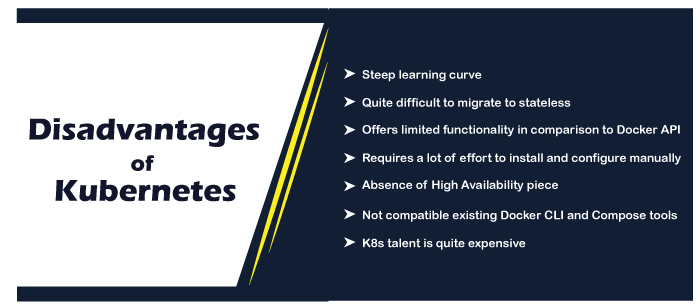Disadvantages of Kubernetes

While Kubernetes offers numerous advantages, it also comes with some challenges and limitations. Here are some of the disadvantages of using Kubernetes:
-
Complexity:
- Kubernetes has a steep learning curve and can be complex to set up, configure, and manage, especially for users who are new to container orchestration and cloud-native technologies. Managing clusters, networking, storage, and security configurations requires expertise and experience.
-
Resource Intensive:
- Running Kubernetes clusters can be resource-intensive in terms of compute, memory, and storage requirements. The infrastructure overhead for running Kubernetes, including control plane components and additional services, can add to operational costs.
-
Infrastructure Complexity:
- Kubernetes abstracts away much of the underlying infrastructure complexity, but managing Kubernetes clusters still requires understanding of networking, storage, security, and other infrastructure components. This complexity can increase operational overhead and troubleshooting efforts.
-
Networking Challenges:
- Networking in Kubernetes can be complex, especially in multi-cluster or hybrid cloud environments. Configuring and managing networking policies, service discovery, load balancing, and ingress/egress traffic routing require careful planning and implementation.
-
Persistent Storage:
- Kubernetes provides support for persistent storage, but managing storage volumes and ensuring data persistence across containerized applications can be challenging. Configuring storage classes, volume provisioning, and handling stateful workloads require careful consideration.
-
Security Concerns:
- Kubernetes introduces new security challenges, including securing container images, managing access control, securing the Kubernetes API server, and implementing network security policies. Misconfigurations or vulnerabilities in Kubernetes clusters can expose organizations to security risks.
-
Vendor Lock-in:
- While Kubernetes promotes portability and avoids vendor lock-in, organizations may still face challenges when switching between different Kubernetes distributions or managed Kubernetes services. Customizations, integrations, and proprietary extensions can lead to vendor dependencies.
-
Monitoring and Observability:
- Monitoring and observability in Kubernetes environments can be complex due to the dynamic nature of containerized applications and distributed systems. Collecting, aggregating, and analyzing metrics, logs, and traces from Kubernetes clusters require robust monitoring solutions.
-
Version Compatibility:
- Managing compatibility between different versions of Kubernetes, container runtimes, and ecosystem tools can be challenging. Upgrading Kubernetes clusters, migrating workloads, and ensuring compatibility with third-party integrations require careful planning and testing.
-
Community Fragmentation:
- The Kubernetes ecosystem is rapidly evolving, with a plethora of tools, frameworks, and projects emerging. While this diversity fosters innovation, it can also lead to fragmentation, compatibility issues, and confusion for users trying to navigate the ecosystem.
]
Despite these challenges, Kubernetes remains a leading platform for container orchestration and cloud-native computing, and many organizations find that the benefits outweigh the disadvantages. Effective planning, proper training, and leveraging best practices can help mitigate these challenges and maximize the value of Kubernetes deployments.
Thank you,
